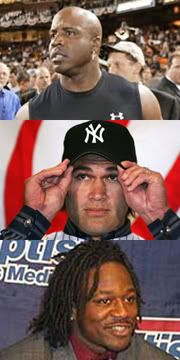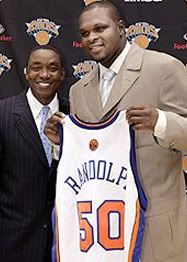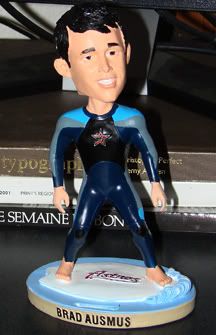
It's coming.
With all that joy that Seattle fans had generated after drafting Kevin Durant, they have to be letting out a collective whimper. When a franchise decides to make a true youth movement and start from scratch, it can be one of the most exciting things that can happen for a fan base. Watching your young players grow and mature and gradually win more games as the develop, fans get a certain feeling of involvement with that team that just isn't the same as with teams that acquire most of their talent from free agency or through trades. The reward is so much greater when you get to watch your team blossom from scratch. That's why, subconsciously, this inevitable move is stinging the true Sonics fans out there in a major way.
What is most convincing about the potential of a move is that these Sonics owners are prepared to net a loss in moving the team to Oklahoma City. Aubrey McLendon, who the above article is about, said as much.
"But we didn’t buy the team to keep it in Seattle; we hoped to come here. We know it’s a little more difficult financially here in Oklahoma City, but we think it’s great for the community and if we could break even we’d be thrilled."
It's a strange thought on ownership that I honestly never considered. A rich man loves the area he lives in. The community, the area, everything about it. This is where him and his other rich friends want to spend money, work and live. By happenstance, a tragedy befalls another team's city and they temporarily reside in said rich guys' area. They know that due to the precarious political situation in the town the tragedy befell, they would likely not be afforded the opportunity to purchase that team. So, knowing the temporary team will eventually return to their old city, they seek out another team to purchase.
Clay Bennett saw his opportunity. The Sonics had been having some major problems in getting a new stadium built in Seattle for some time now. Seeing an opportunity to nab a franchise that could potentially move cities, Bennett and his compadres moved in. Their thoughts from the beginning were to move a team to Oklahoma City, that has become rather clear. Of course, they fed some public relations lines to the fans about wanting to stay in Seattle, and they will likely do that same until the move to Oklahoma is approved.
And good for them. Of course, the fans in Seattle are getting screwed pretty good by no control of their own. Unfortunately for them, it isn't their team. It's owned by the guys who purchase it. Sorry, that's how it works.
Now, the ownership group headed by Bennett will be able to move a professional sports team into their backyard, likely helping to pump money into their hometown economy and have a professional pet project to groom. Fortunately enough for them, their pet project is already looking like it has the makings of a thoroughbred.
 Reasonably yours,
Reasonably yours,Scooter
E-mail us

 There's an epidemic going around. It spreads in newspapers, gyms, slow-pitch softball games, churches and pretty much anywhere that sports are discussed and debated. It's called I'd Never Do That syndrome.
There's an epidemic going around. It spreads in newspapers, gyms, slow-pitch softball games, churches and pretty much anywhere that sports are discussed and debated. It's called I'd Never Do That syndrome. Thank you Isiah Thomas for constantly keeping me in stitches. And thank you Zach Randolph for being a nutburger-crazy man who has overrated stats and makes buckets of money.
Thank you Isiah Thomas for constantly keeping me in stitches. And thank you Zach Randolph for being a nutburger-crazy man who has overrated stats and makes buckets of money. Travis and I wrapped up our weekend of semi-debauchery by attending our second Astros game of the weekend, the second game of a three-game series against the Seattle Mariners. Saturday's giveaway was a Brad Ausmus surfer bobblehead doll (pictured) to the first 10,000 attendants. We got to the game about 30 minutes ahead of time, but unfortunately, all of the bobbleheads were gone. We were unhappy as each of us really wanted one.
Travis and I wrapped up our weekend of semi-debauchery by attending our second Astros game of the weekend, the second game of a three-game series against the Seattle Mariners. Saturday's giveaway was a Brad Ausmus surfer bobblehead doll (pictured) to the first 10,000 attendants. We got to the game about 30 minutes ahead of time, but unfortunately, all of the bobbleheads were gone. We were unhappy as each of us really wanted one. 



